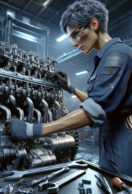Introduction: The Evolution of Automobile Engines and Their Impact on Modern Vehicles
The evolution of automobile engines has been a remarkable journey, marked by significant technological advancements that have shaped modern transportation. Initially, vehicles were powered by steam and electric engines in the late 19th century before the internal combustion engine gained dominance in the early 20th century. This shift was largely due to the work of innovators like Karl Benz and Henry Ford, whose gasoline-powered engines offered greater efficiency and range than their predecessors. Over time, engine technology continued to advance with the introduction of fuel injection systems, turbocharging, and computer controls that enhanced performance while reducing emissions. In recent years, hybrid and electric engines have emerged as game-changers in response to environmental concerns and the demand for sustainable transportation options. These modern vehicle engines not only revolutionize how we travel but also reduce our carbon footprint significantly. As engine technology continues to evolve, it holds the promise of cleaner air and more efficient modes of transport for future generations.
The Rise of Electric and Hybrid Engines: A Game Changer for the Automotive Industry
The automotive industry is undergoing a significant transformation as it embraces electric engines and hybrid vehicles, marking a pivotal shift toward sustainable engine technology. Electric engines, which rely on battery power rather than fossil fuels, offer a cleaner, more environmentally friendly alternative to traditional internal combustion engines. Meanwhile, hybrid vehicles combine the benefits of both electric and gasoline-powered engines, providing improved fuel efficiency and reduced emissions without sacrificing performance. This innovation is driven by a growing awareness of climate change and the need for sustainable solutions in transportation. Automakers are investing heavily in research and development to enhance battery technology, improve charging infrastructure, and make these advanced vehicles more accessible to consumers. As these technologies continue to evolve, they not only promise to reduce carbon footprints but also signal a new era of automotive engineering that prioritizes sustainability without compromising on functionality or driving experience.
Turbocharged and Supercharged Engines: Enhancing Performance and Efficiency
Turbocharged engines have become a cornerstone of high-performance vehicles, delivering impressive power and enhanced driving experiences. By forcing more air into the engine's combustion chamber, turbochargers significantly increase horsepower and torque without requiring a larger engine size. This innovation allows car manufacturers to produce smaller, more efficient engines that still offer the exhilarating performance enthusiasts crave. Supercharged performance further exemplifies advancements in engine efficiency by providing immediate power boosts through mechanically driven compressors that eliminate lag time, ensuring swift acceleration and responsiveness. Together, these technologies highlight the ongoing evolution of automotive engineering, where maximizing fuel efficiency does not compromise speed or strength. Consequently, high-performance cars today are not only faster and more powerful but also environmentally conscious and economically viable for consumers seeking both thrill and practicality.
At All in the Wrist Diesel and Auto Repair in Albuquerque, we can help you with all areas of your gasoline and diesel engine maintenance and repair, contact us to set an appointment.




